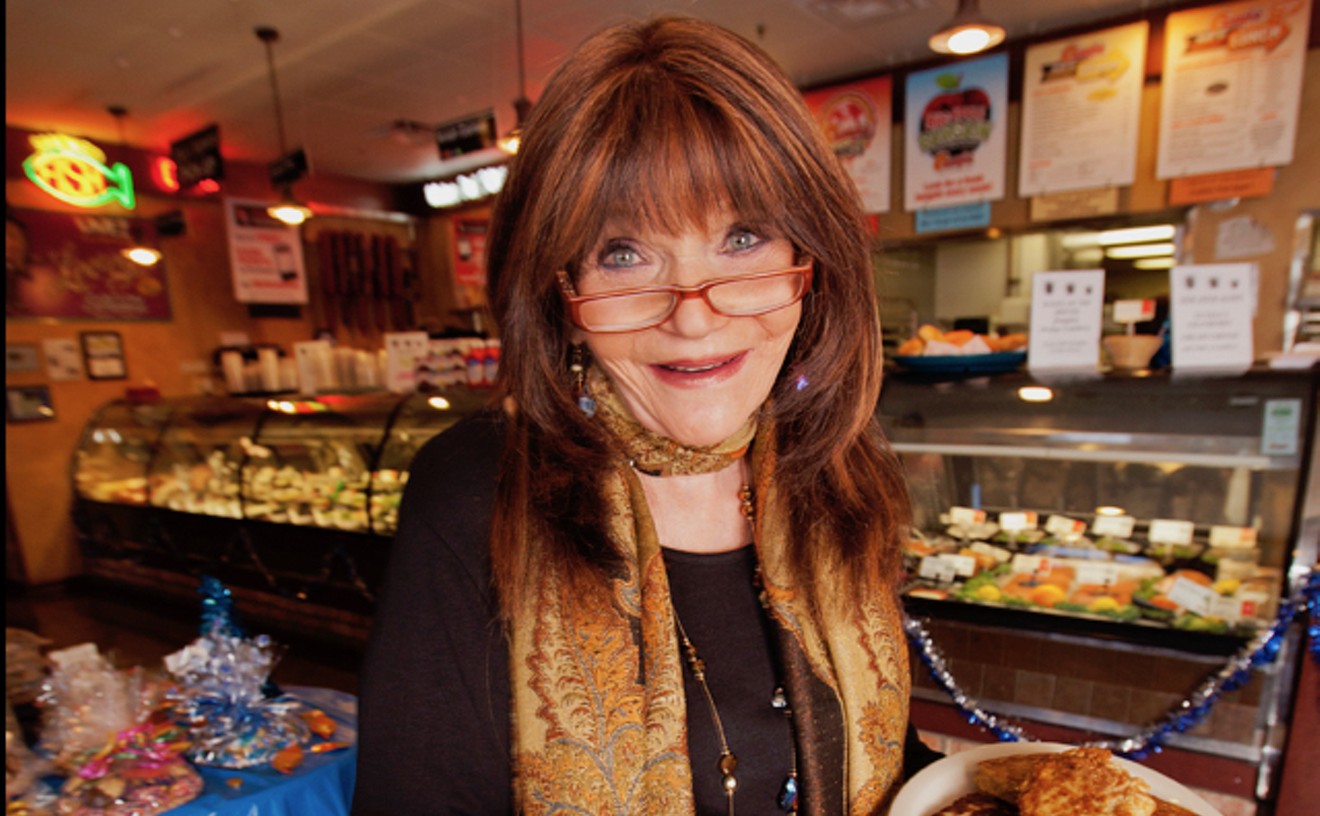The Middle East is a bubbling caldron of conflict. The region always seems on the verge of boiling over with political strife, religious animosities, ethnic divisions and cultural tensions.
And now, judging from my mail, you can add culinary disputes to the list.
It seems you don't have to discuss explosive topics like the West Bank settlements, the Sunni-Shi'a rift, the suppression of the Kurds or the effects of Western influence to get a reaction from sensitive readers. All you have to do, as I innocently did, is to say there's a category of dishes we can group together and call "Middle Eastern cuisine."
What does that phrase mean? It simply suggests there's a way of using similar ingredients in a similar manner that's common to the region. For the most part, the fare transcends the borders of individual states, as well as religious, ethnic and cultural differences among the cooks.
This point of view didn't please some correspondents. One urged me to expel Iran from the Middle East. Another told me that the "Middle East" label is misleading and insisted I reclassify the fare along national lines.
There's room for honest disagreement. But whatever your position, I don't think there's any room for disagreement about what's coming out of the kitchen at Al Amir. This is the best new Middle Eastern restaurant to hit the Valley in quite some time.
Al Amir has got more going for it than just the food. Unlike most of its ethnic-joint competitors, the restaurant has a touch of class. Sure, it looks out over a strip-mall parking lot. But the tables are lined with red tablecloths; the servers are dressed in cafe-waiter vests; and the walls are hung with weavings, embossed brass plates and tourist bureau shots of Lebanon, the proprietors' home country. And while there's the inevitable idiot box in the corner, at least it's televising Arabic music videos and not ESPN tractor pulls.
If you dine here on a Saturday night, you won't be distracted by the television. That's because there's live belly dancing. Come armed with dollar bills--you appreciatively stuff them in the belly dancer's outfit when she gyrates past your table at the end of her set.
However, if you're like me, it will take more than a wiggling female to distract you from Al Amir's fare. It's the real deal: fresh, homey and full of hard-hitting flavors.
Appetizers are just as important as main dishes at the Middle Eastern table, and Al Amir's get the treatment and respect they deserve. I could make a meal of them, and so can you, if you order the vegetarian combo for two, a nine-item sampler.
Among the combo highlights: baba ghanouj, a smoky, grilled eggplant dip; tabbouleh, a blend of finely chopped parsley, onions, tomato and bulgur wheat; falafel, ground chickpeas and fava beans, formed into a ball and deep-fried; warak 'enab, lusciously moist rice-stuffed grape leaves, vigorously doused with lemon juice and olive oil; fatayar, a phyllo-dough pouch filled with creamy white cheese; foul mudamas, fava beans simmered with lemon juice, olive oil and lots of garlic; and moujadara, mashed green lentils topped with fried onion. Rip into the pita bread, and start dipping away.
Two other starters, not part of the combo, are worth ordering on their own. Safiha are canape-size pockets of dough filled with ground lamb, onions, tomato and pine nuts. Ma'anek are a lot more substantial. They're Lebanese sausages, incredibly juicy and zinging with the flavors of just about every spice in the rack. You get eight of them, each about the size of a large index finger, served in a bowl with French fries, all sitting in a tangy puddle of lemon juice.
If ma'anek sound too filling, the soup makes a good alternative, especially this time of year. The lentil soup, stocked with cilantro, spinach and potato and accompanied by pita croutons, tastes like someone's mother has been fussing over it for hours.
And if appetizers seem too daunting, you can always quash the munchies by nibbling on the olives, pickled turnips and pita bread that greet you when you're seated.
Main dishes sparkle. I generally avoid chicken because it's too bland. But I wouldn't sidestep the lovely shish tawook, chicken breast fragrantly marinated and grilled. Kofta kebab features skewered ground lamb, zipped up with onions and parsley. Shish kebab will please beef fans--the meat is especially tender.
Al Amir also whips up hard-to-find entrees like lahem bilajyn. Think of it as a Middle Eastern pizza: a pita crust coated with ground beef mixed with tomatoes, onions and pine nuts. Kebbe bil sanyeh is sensational, layers of heavily seasoned ground beef enfolding a mix of bulgur wheat and pine nuts, all baked to crusty perfection and served with a refreshing yogurt salad. It's hard to imagine $8.95 spent any other way could give you more pleasure. And the shawarma here reminds me of what I used to get in the old country: moist strips of rotisserie-cooked beef, gilded with tahini, a fragrant sesame-seed paste.
Stick around for dessert. Middle Eastern desserts can often be overpoweringly sweet, but Al Amir's homemade treats avoid that trap. Honey-soaked baklava is a turn-on, and so is the cylinder of date-stuffed phyllo dough. But for real excitement, try knafeh, a warm cheese pastry smothered in syrup.
The only weakness in Al Amir's arsenal? The Arabic coffee--it's watery and lacks a cardamom-scented punch.
These days, you don't need a magic carpet to get an authentic taste of the Middle East. All it takes is directions to Al Amir.
King Tut Cafe, 1044 South Terrace, Tempe, 921-1670. Hours: Lunch and Dinner, Monday through Saturday, 11 a.m. to 11 p.m.; Sunday, 11 a.m. to 8 p.m.
King Tut is not the kind of restaurant that's going to attract folks looking to whoop it up on a Saturday night. It draws a somewhat different clientele: budget-challenged ASU students and homesick natives, both looking for a comfortable place to relax and fill up, a home away from home.
It doesn't take long to figure out why King Tut has a heavy Middle Eastern customer base. On one visit, I saw the accommodating staff bring out a hookah to a patio table. It's a Middle Eastern water pipe, designed with a long hose that passes through an urn of water which cools the tobacco fumes as they're drawn through. You see hookahs in use at restaurants all across the region (by men only), but this is the first time I've seen a public exhibition in our neck of the desert.
King Tut also has a giant-screen television and satellite dish, which brings in signals from the Arab-language station in Washington, D.C. I didn't catch the title of the featured Egyptian movie one evening, but it was a hoot. (King Tut's proprietors are Egyptian.) Obviously a government-sponsored production, the film followed the evil machinations of the Islamic Brotherhood, while we followed along through the English subtitles. Aiming to drive out Western influence and turn Egypt into a Muslim state, these bad guys shot up a busload of innocent tourists. In the end, to no one's surprise, the valiant Egyptian security forces prevailed.
While the movie had neither subtlety nor artistic merit, the food at King Tut has some of both. The appetizers are particularly effective. The hummus may be the best in town: fresh, creamy and vibrant with the flavors of lemon, garlic and tahini. Gebna bel tamaten is also first-rate, a small salad put together with diced tomatoes, onions and crumbled feta cheese, drizzled with olive oil.
Badingan mekhallel makes no concession to Western taste buds. It's pickled eggplant, stuffed with enough garlic to keep the werewolves at bay for about a thousand years.
Unlike the fatayar at Al Amir, the one here is dull, squishy dough lined with a bit of innocuous meat. The tabbouleh isn't quite up to standard, either, falling short in the zest department.
If you prefer your nibbles deep-fat fried, samboosa make a good choice. They're related to Indian samosa: crispy pouches filled with seasoned meat and pine nuts. The kobeda also shows why the Middle East is often described as "oil rich." You get three deftly crafted, egg-shaped balls rolled with bulgur, meat and pine nuts.
The main dishes don't have quite the same flair as the appetizers. King Tut's version of moussaka, however, aroused my enthusiasm. That's because I love eggplant, and this moussaka is basically an eggplant pie, lightly seasoned with ground beef. Unlike the Greek model, this dish is moistened with a rich tomato sauce, not the traditional bechamel sauce.
If you're into animal protein, the kofta mashweya should satisfy your craving. They're Middle Eastern meatballs, ground beef mixed with onions and parsley, and you get at least a pound of them.
I haven't seen koshari served at other Valley Middle Eastern restaurants. Maybe they should be: It's a starchy blend of rice, lentils and elbow macaroni, coated with an unexpectedly spicy tomato sauce and yummy fried onions.
Sadly, there's nothing notable about the other dinner staples. The kitchen doesn't seem to have its heart in the overcooked shish kebab, lackluster chicken or shawarma that's been grilled instead of sliced off a rotisserie.
But the kitchen does take an interest in desserts. They're scrumptious, especially the besboosa, a semolina flour cake drenched in sweet syrup and sprinkled with coconut and nuts, and the knafeh, topped with crushed pistachios. The Arabic coffee is also outstanding, perfectly sludgy and sweet.
Peace in the Middle East? I keep hoping. In the meantime, at least, you can find a genuine piece of the Middle East at King Tut.
Al Amir:
Ma'anek
$6.95
Kebbe bil sanyeh
8.95
Shish tawook
9.95
Vegetarian combo
27.95
King Tut Cafe:
Hummus
$1.99
Kobeda
2.29
Koshari
4.99
Moussaka
6.49










